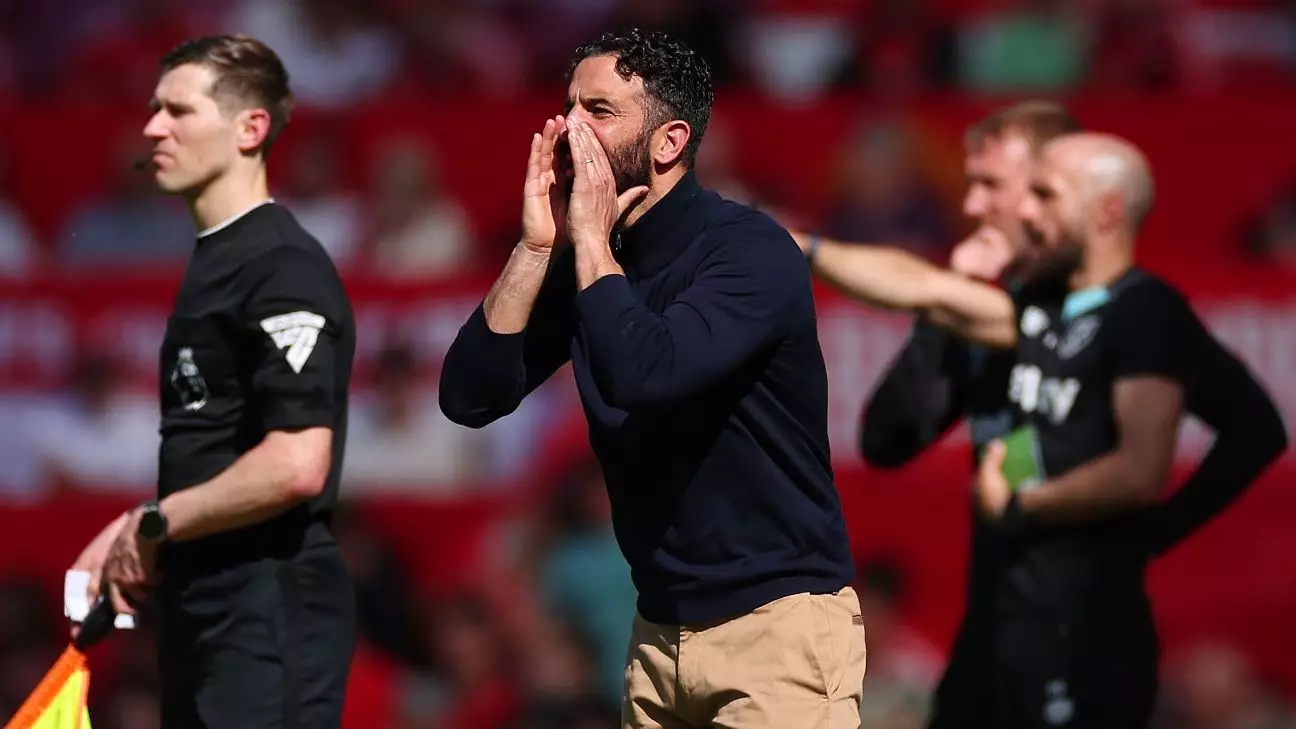In the unforgiving arena of modern football, few clubs have faced a challenge quite like Manchester United. Under the stewardship of Ruben Amorim, the team has faltered, culminating in a disheartening 2-0 defeat to West Ham. This dismal performance marked their 17th loss of the season, leaving United languishing dangerously close to the relegation zone at a troubling 16th place—an abysmal ranking reminiscent of their darkest days. Touted for their illustrious history, it’s bewildering to witness a club that once dominated English football now gripped by uncertainty and despair.
The post-match atmosphere was charged with raw emotion as Amorim openly expressed his embarrassment regarding the team’s current standing. Such honesty from a manager is rare; he implicitly acknowledged a growing crisis that transcends mere statistics. “How is a manager of Manchester United supposed to feel in this position?” he asked, evoking a collective patience that has dangerously eroded. This question is one that resonates with players and fans alike, highlighting the despair that has infected the club.
A Culture in Crisis
Delving deeper into Amorim’s psyche, his comments shine a light on what he perceives as a lack of urgency, a sentiment echoed by countless supporters disillusioned by the apparent complacency surrounding the team. The phrase “it’s okay” seems to have infiltrated the locker room mentality, suggesting an unsettling acceptance of mediocrity. The notion that losing games—especially at home—has transformed from a catastrophic setback into a mere inconvenience is alarming. Such a mentality threatens to erode the very foundation of what it means to play for Manchester United.
Amorim refrains from pointing fingers at specific players, instead placing the emphasis on the collective malaise that has pervaded the club. Speaking about the culture—or lack thereof—he touches on a philosophical dilemma: how do you instill urgency in a group seemingly content to wallow in underachievement? His admission that this “feeling” is the most pressing concern signals the imperative need for this situation to be addressed at the core. In many ways, what Amorim articulates is the essence of a larger struggle between excellence and acceptance, a battle that United must win if they are to reclaim their legacy.
Confronting the Future
While Amorim reflects on his managerial responsibilities, he also grapples with the precarious nature of his position. With a contract lasting until 2027, one would assume stability. Yet, the reality is stark: failure to reverse the current trajectory may force the club to consider drastic measures. The notion of “new blood” is a possible consequence that hangs ominously in the air, a reminder that in football, success is often measured not just in trophies, but in results. As Amorim himself concluded, the need for a robust summer overhaul is crucial, underlining an awareness that complacency now could set the stage for further long-term decline.
In this context, the upcoming matches against Chelsea and Tottenham loom large. Winning is imperative—not just for points, but for morale. As Amorim pointedly suggests, the prospect of competing in the Champions League may currently appear overly ambitious. The fear that United could when navigate these treacherous waters might pose a larger existential crisis for the club is palpable.
The Ticking Clock of Opportunity
Ultimately, what hangs in the balance is not just immediate performance, but the future ethos of Manchester United. As Amorim makes clear, the current focus cannot solely rest on cup finals—it must transcend strategy and results to reach a fundamental reckoning with the club’s identity. Understanding that competing at the highest level entails both physical and psychological readiness is crucial. The reflections shared by Amorim ought to serve as a wake-up call, not only to those at the helm but to the entire football community surrounding the club.
The reality of the situation is sobering: Manchester United stands at a crossroads, one that could lead to revitalization or further ruin. As their supporters rally behind the team, the hope for a revival rests with Amorim and whether he has the courage and vision to restore a sense of urgency and honor to the storied institution that is Manchester United.

